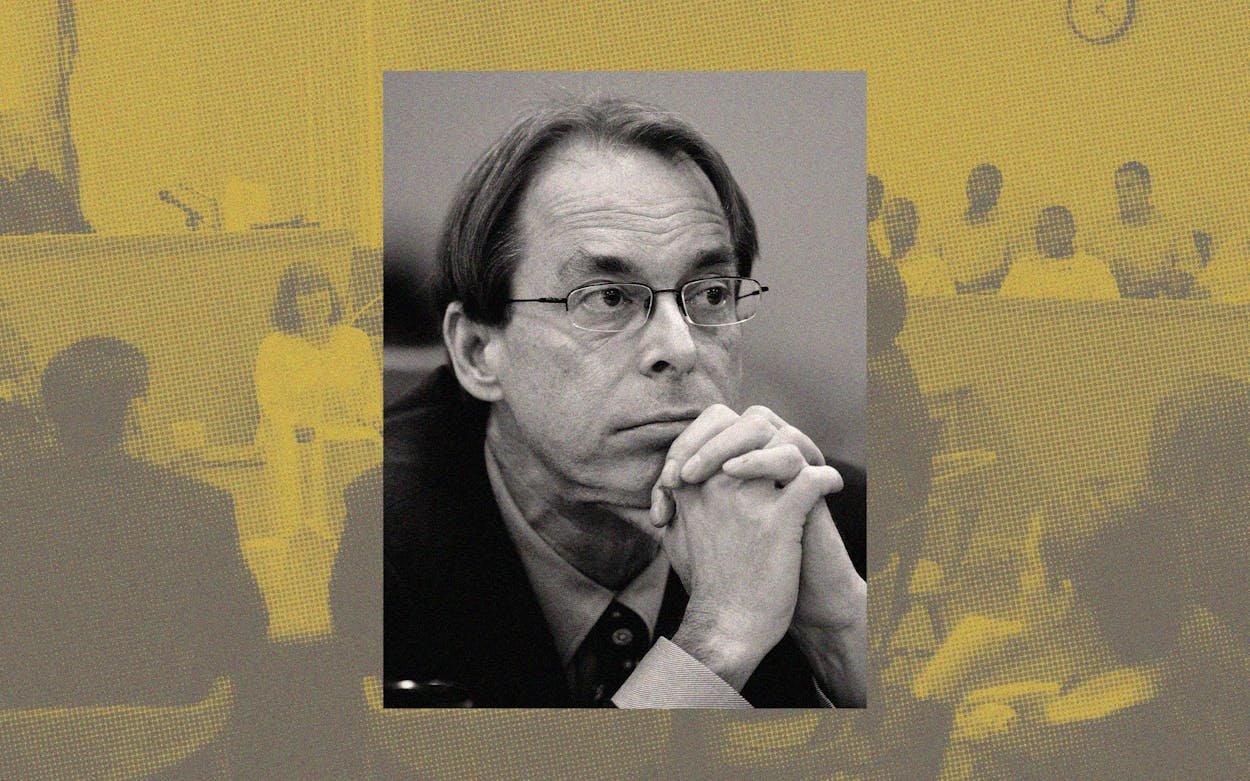On Tuesday, February 7, 2023, Jeff Blackburn passed away from cancer at the age of 65. A cofounder of the Innocence Project of Texas, Jeff was instrumental in exposing a sham drug-sting operation involving nearly fifty innocent residents of Tulia and worked tirelessly to achieve a posthumous exoneration for Timothy Cole, a Texas Tech student and Army veteran who was wrongfully convicted of sexual assault in 1986 and died of an asthma attack while in prison. The list of contributions Jeff made to criminal justice reform—especially in collaboration with Governor Rick Perry’s administration—is long and well chronicled. His role in changing forensic science is discussed less.
We met Jeff in our respective roles with two organizations—the Texas Forensic Science Commission and the Texas State Fire Marshal’s Office. It was 2011, and the Forensic Science Commission had just released a long-awaited report on the science and investigative techniques used in two arson death-sentence cases: those of Cameron Todd Willingham and Ernest Ray Willis. Willingham was executed in February 2004; in October of the same year, Willis was freed by a federal court based on new evidence, including the confession of an alternate suspect.
The commission’s report refrained from commenting on guilt or innocence in either case. It instead described the ongoing evolution in our understanding of the way fire behaves, including a review of signs once thought to constitute definitive proof of arson. The report then made a list of recommendations, including a controversial one at the time: the charge that authorities with appropriate jurisdiction—such as the Texas state fire marshal—had a duty to correct cases in which significant conclusions were drawn from science no longer considered reliable.
After the commission issued the report, its job was done. The controversy subsided. But the looming question remained—would Texas evaluate old arson cases? And how?
Enter Jeff Blackburn and the Innocence Project of Texas. Until that point, the national Innocence Project had been front and center in the Willingham and Willis cases, taking the same adversarial posture as if it were in a New York courtroom.
But Jeff took a different approach. With his larger-than-life personality, strong roots in West Texas, and deep understanding of what matters to the average Texan and Texas policymakers, his message was simple and clear: IPTX would take responsibility for identifying potential mistaken-conviction arson cases and bringing them to the state fire marshal. He promised his team would conduct this review responsibly, with the understanding that the vast majority of arson convictions were righteous convictions. He asked: If IPTX brought forward cases in which it believed an innocent person might have been convicted on outdated science, would the state fire marshal take another look?
The Fire Marshal’s Office—for the first time in the history of any state—said yes.
One thing that made it easier to answer the call was that Jeff defended fire-scene investigators as passionately as he defended the wrongfully convicted. He knew investigators were taught to believe that certain physical phenomena left by a fire, like crazing of glass, burn marks on the floor, or spalling (surface chipping) of concrete, were sure signs the fire was intentionally set. He believed local investigators wanted as much as anyone to make the right call, and if anyone or anything should be held to account for misunderstanding, it was a system in which the most current scientific knowledge did not always make it to the front line. Jeff was much more willing to blame the resource, training, and communication failures of the federal government and the academic elite than to point the finger at people who respond to fire scenes. He saw them as part of the solution.
Thus began a collaboration between the Fire Marshal’s Office, IPTX, local investigators, and subject-matter experts in fire science. As promised, the floodgates never opened, and the criminal justice system did not collapse under the weight of the arson-case reviews. The six or so cases identified by IPTX as meriting attention got the attention they deserved. And the Texas state fire marshal’s Science Advisory Workgroup became a model for other states approaching their own cases.
Jeff’s ability to forge relationships between people and organizations in Texas that would not have otherwise worked together was remarkable. His quest for justice was never narrow or myopic. He knew the issues were complex, and that a just culture in forensic science and crime-scene investigation required an approach that resisted the tendency to assign blame or become defensive. It is that legacy that carries on in our work today, and for this we will be forever grateful.
Lynn Garcia is the director of the Texas Forensic Science Commission. Chris Connealy is the senior director of emergency services in Williamson County.
- More About:
- Obituaries






